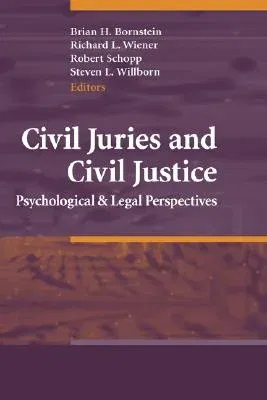Civil Juries and Civil Justice: Psychological and Legal Perspectives (2008)Hardcover - 2008, 15 November 2007

Qty
1
Turbo
Ships in 2 - 3 days
In Stock
Free Delivery
Cash on Delivery
15 Days
Free Returns
Secure Checkout

Print Length
286 pages
Language
English
Publisher
Springer
Date Published
15 Nov 2007
ISBN-10
0387744886
ISBN-13
9780387744889
Description
Product Details
Book Edition:
2008
Book Format:
Hardcover
Country of Origin:
NL
Date Published:
15 November 2007
Dimensions:
23.39 x
15.6 x
1.75 cm
Genre:
Law Studies
ISBN-10:
0387744886
ISBN-13:
9780387744889
Language:
English
Location:
New York, NY
Pages:
286
Publisher:
Weight:
594.21 gm